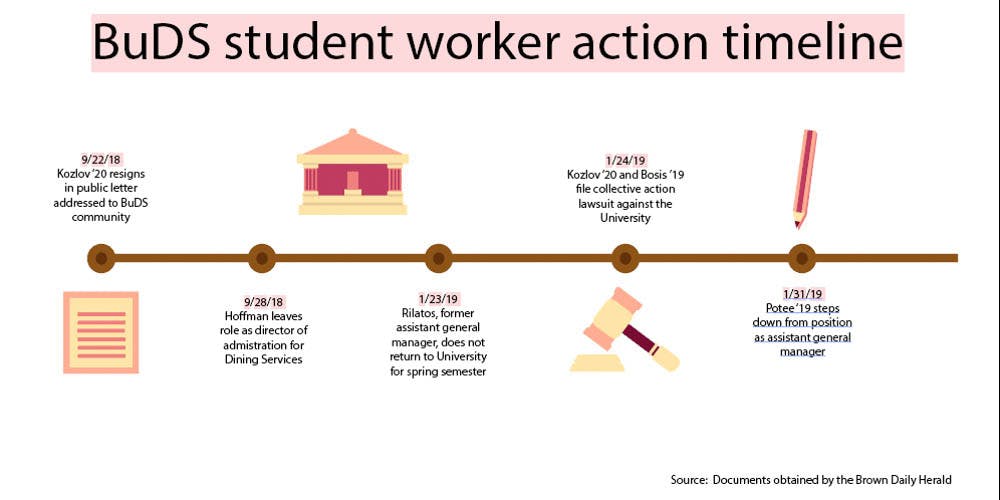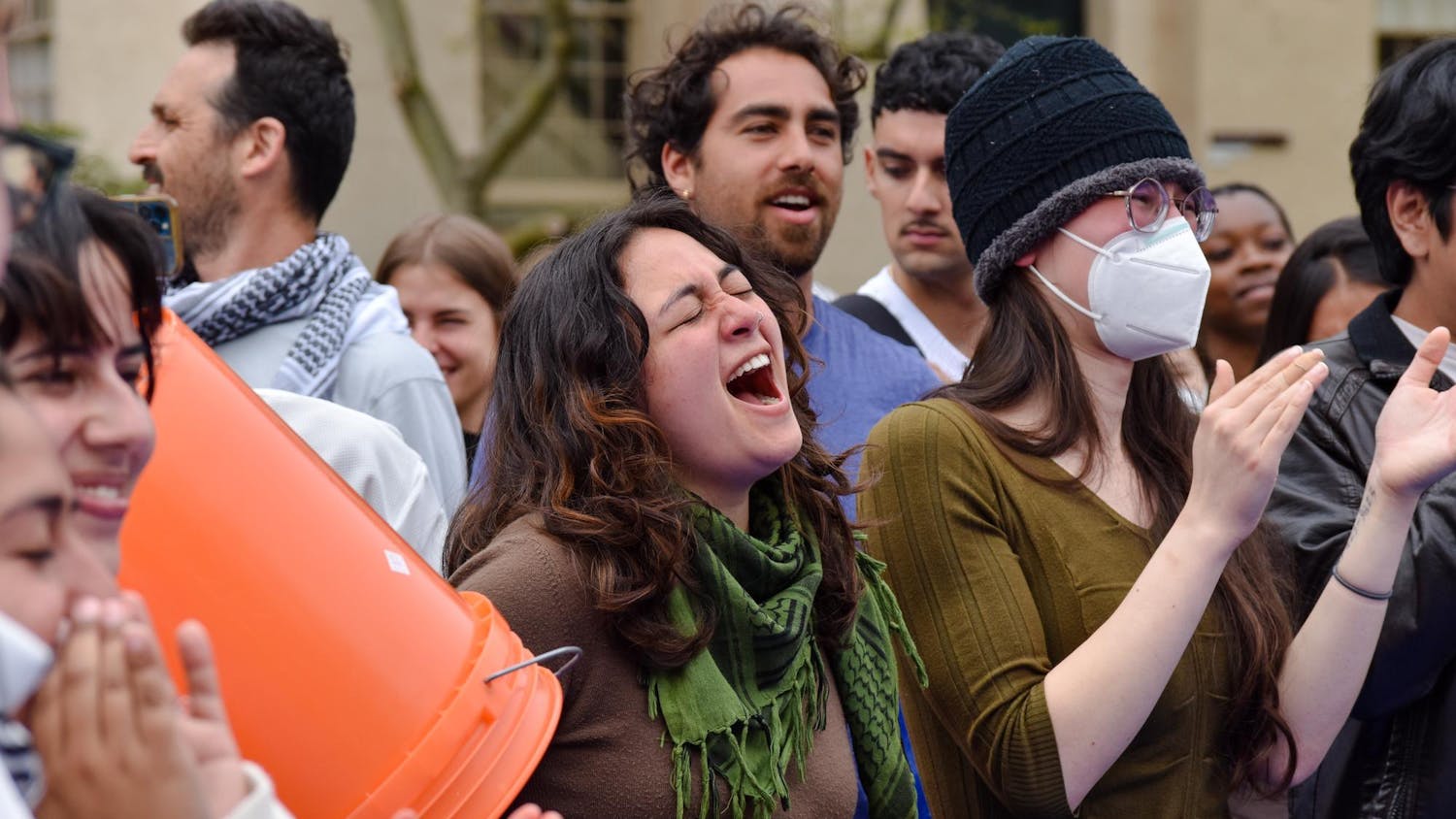Following a number of changes to the policies and leadership of Brown Dining Services student employees, members of the BuDS Student Management Team have voiced fears that BDS is not prioritizing the needs of student workers.
The Herald spoke to six of the 12 current members of the BuDS SMT and one former member of the team. Four students expressed concerns about the restrictive nature of the newly instated 20-hour-per-week cap for BuDS workers and an increase in mandatory shift lengths.
The same four students also described their concerns about the replacement of student management positions with professional staff this semester, which they fear signals a shift away from a student-run organization.
The University has not yet made a decision about the program’s supervisory structure following the spring semester, wrote Director of News and Editorial Development Brian Clark in an email to The Herald. A working group made up of dining staff and student managers is currently reviewing the leadership program within BuDS. BDS expects to make “final decisions on the supervisory structure for 2019-20 over the summer,” Clark wrote.
These BuDS policy changes went into effect after two students filed a class action lawsuit alleging the University did not compensate them properly for their work. Fifteen current and former BuDS employees have since joined the lawsuit as of April 21, The Herald previously reported.
Professional staff take over student management roles
BuDS student management positions for this semester have been temporarily filled by Bobby Noyes, BDS assistant director for retail dining, and Sheila Coleman, director of human resources, Clark wrote.
After former General Manager of BuDS Savanna Rilatos ’20 and former Assistant General Manager of BuDS Benjamin Potee ’19 left their positions this semester, the University chose to fill their positions with professional staff because the semester was already underway, Clark wrote.
The past three general managers of BuDS did “not complete their traditional terms of service within BDS,” wrote a former member of the SMT, who wishes to remain anonymous for fear of professional repercussions, in an email to The Herald. “There are good questions to be asked about the pressure this position puts on an individual.”
The assistant general manager and general manager positions “consist of responsibilities that are both administrative … and deeply interpersonal,” the source wrote. By shifting these responsibilities to professional staff, BDS risks increasing the chance that students are uncomfortable reporting problems to their management, he added. Professional staff are removed from students’ daily lives and problems, which increases the chance they will be unable to appropriately relate to or manage students, he wrote. In the past, students have come to the general manager and the assistant general manager about Title IX violations and mental health concerns, and the former member of the SMT believes “that it is less likely for a student to go to a less accessible administrator.”
Without students filling these two roles, there will be less accountability for BDS administrators, said another member of the SMT who wishes to remain anonymous for fear of professional repercussions. Students in the AGM and GM positions served as an essential buffer between BuDS and BDS and ensured students’ concerns were heard, she said.
By not replacing the AGM and GM with students, “it feel’s like they’re consolidating power,” the source said. Furthermore, with professional staff taking on the duties of AGM and GM, BuDS “is technically not student-run,” she added.
But Clark wrote “the changes to the program made to date — and any that may be made moving forward — are focused on enabling students to effectively balance their academic study and other activities with their employment.”
Student working hours capped at 20 per week
At the start of the semester, BDS implemented a new policy: BuDS workers are now limited to working “a maximum of 20 work hours per week,” Clark wrote in an email to The Herald. Previously, there was no upper cap on working hours, and many students worked more than 20 hours per week, particularly in the supervisory and unit manager positions, The Herald previously reported.
As a result, “last semester we asked to have a soft way to prevent students from over working,” wrote Mathilde Barland ’21, a member of the SMT, in an email to The Herald. BDS and BuDS previously made changes — such as increasing wages for student workers and eliminating on-call hours — to make BuDS a more desirable work environment and reduce the workload for supervisors and unit managers, The Herald previously reported.
BDS set this cap “to ensure the ability for student workers to effectively balance their academic work and other activities with employment,” Clark wrote. Students’ requests to work more than 20 hours per week will be considered on an individual basis. BDS will approve students’ requests to work beyond the 20-hour cap “only in exceptional circumstances,” Clark wrote. But four students who spoke with The Herald said this system is both inefficient and can feel invasive.
Students may feel uncomfortable sharing their personal reasons to justify their request to work beyond the cap, Barland wrote. For example, “people in the administration are not students or do not always understand that having to pay a $1,000 medical bill is actually a lot of money for someone whose only source of income is what they earn through BuDS,” Barland wrote.
Isabella Teran ’19, a member of the SMT, said she had to go through an extensive process to get approval to work more than 20 hours in a week. Teran, who takes classes at both Brown and the Rhode Island School of Design, was hoping to “rack up hours” to help with her family’s financial situation at home before her RISD classes began in the spring. “I thought I could work a ton, and it wouldn’t necessarily impede academics. I just wanted to work more,” she said.
When Teran sent an email to administrators notifying them that she would be working more than 20 hours, she engaged in back and forth communication with administrators before being referred to the Office of Financial Aid.
“There’s a lot of stress for low-income students trying to balance financial circumstances and academics. But this wasn’t one of those scenarios,” Teran said. The Financial Aid Office offered to give Teran emergency funding, but she did not feel that her situation merited emergency funding and declined the offer. After speaking with the Financial Aid Office, Teran circled back to BDS and was then allowed to work more than 20 hours. “So much time was wasted on that. It should’ve been such an easy situation to handle,” Teran said.
Mandatory shift lengths increase
The University has mandated an increase in shift lengths for many dining units. In the carts unit, shifts have increased from two hours to three or more hours. Four students on the SMT allege that the University is prioritizing the needs of temporary workers by increasing shift times, which they say is more convenient for those workers and more inconvenient for student workers due to their class schedules.
“As a student, you don’t have a three to four hour block in your day. A lot of the workforce is underclassmen,” a member of the SMT said.
In an email exchange reviewed by The Herald, a student involved in BuDS wrote to a BDS administrator criticizing the extended shift times. In response, the administrator explained that motivations for the change include demand from professional staff for longer shifts.
There is “no effort underway in Dining to prioritize the needs of temporary employees over student workers,” Clark wrote. “Adjustments to shift lengths are not intended to prioritize temporary employees over student workers, but rather to provide Dining with the ability to have the required staff on hand to meet campus dining needs.”
“Brown typically relies on temporary employees for short-term operational needs or instances in which significant flexibility is required,” Clark wrote.
Clark said their focus is on “addressing the concerns raised directly by the students themselves about work hours, compensation and employment structure.”





